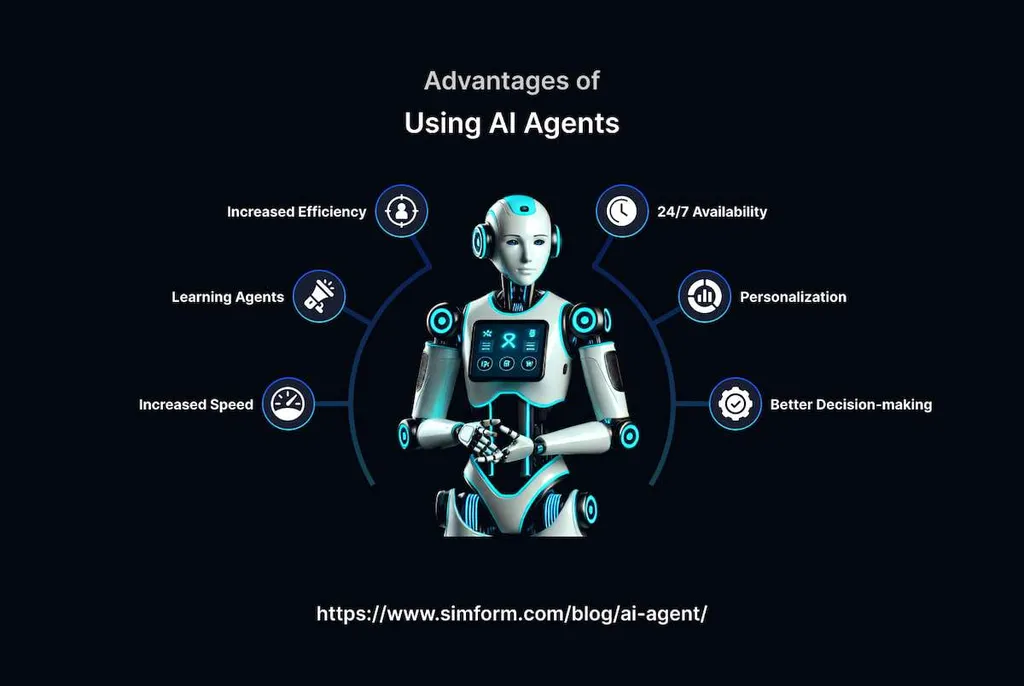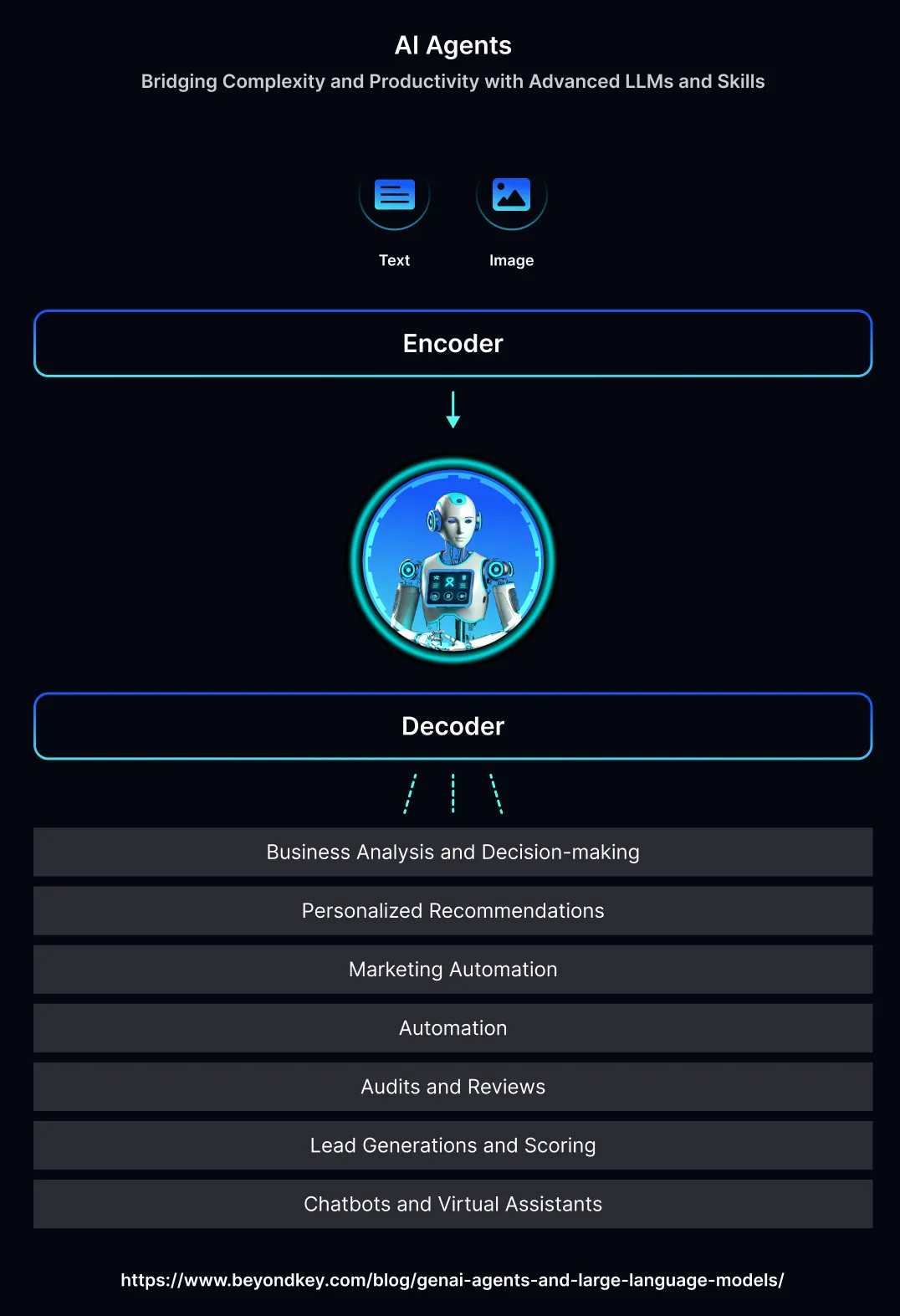Businesses recognize the result-yielding potential of deploying Artificial Intelligence (AI) solutions and implement them in their daily operations. Virtual agents allow companies to improve the quality of their customer service (CS) and provide personalized responses to clients. Powered by Large Language Models (LLMs), digital helpers leverage AI to maintain engaging conversations using a natural-sounding tone of voice. Firms should learn how to use this technology to transform their CS strategies. In this guide, we will explore how enterprises can increase their profits and establish a noticeable market presence by integrating generative AI agents with legacy systems.
What Are Generative AI Agents?
The term refers to computational tools designed to interact with consumers in a human-like way. Unlike rule-based chatbots, genAI agents remember past conversations, analyze large volumes of data, and provide context-relevant replies to customer queries.
The CS industry has to deal with multiple challenges, as it becomes increasingly difficult to meet client expectations. Reducing the churn rate and maintaining high-quality services even during peak times is possible through the integration of virtual assistants.
According to Capgemini, 82% of businesses are going to integrate AI solutions within the next 1–3 years to automate time-consuming tasks. Generative agents provide professional-level services, helping companies to offer recommendations based on client preferences.
Why Use Generative AI Agents

Based on complex LLMs, AI bots have an extensive capacity to process large volumes of data. They analyze interactions across multiple channels, identify trends, recognize behavior patterns, and allow human employees to spend less time on tedious tasks. Below, we have outlined the most noticeable advantages of using such solutions:
- Making interactions more engaging: GenAI models are designed to maintain conversations and enhance customer experience (CX). They cater to buyers’ needs, assist consumers with product discovery, and update them on shipping status. Trained to solve complex queries, they can fully replace human agents in many situations.
- Reduced expenditure: GenAI agents answer queries 24/7. Companies no longer need to hire new staff members during peak seasons, as AI bots handle the increased workload. They answer multiple conversation threads simultaneously. For instance, AI-based CS systems created by MetaDialog allow businesses to automate up to 87% of conversations within an hour. This allows enterprises to avoid bottlenecks and increase the satisfaction rate. MetaDialog’s solutions enable firms to increase the productivity of their CS teams by up to 5 times. It enables businesses to allocate resources to other critical areas.
- Interactive training: Preserving human capital necessitates introducing upskilling programs for employees. Generative AI agents train staff using a variety of scenarios and situations.
- Discovering customer preferences: The in-depth analysis of buyer behavior patterns enables firms to learn more about their needs and optimize CS strategies. A business can test different methods and compare client satisfaction.
MetaDialog’s products allow firms to reduce the average response times to 20 seconds, making it easier to expand the scope of their operations.
Generative AI Agent Examples

According to McKinsey, the genAI market is expected to generate $300 billion annually by 2035. Companies have already started to integrate algorithm-based tools with legacy systems. Businesses maintain a cutting edge by following their lead and discovering innovative use cases.
GenAI bots are used to streamline such processes:
- Loan underwriting: Financial organizations use AI tools to analyze possible risks of extending credit. It requires analyzing information from different sources and comparing various scenarios to reduce risks. Credit managers review the collected data and confirm the operations. AI systems comprising multiple genAI agents develop a plan, communicate with borrowers and financial institutions, generate documents, and send them to financial analysts and other agents to remove discrepancies. Advanced solutions allow companies to expedite review cycles by 20-60%. Besides, they allow agents to use data from multiple channels, get a complete overview of processes, and verify inputs without delays.
- Code improvement: Companies using legacy apps and systems need to remove security issues that can compromise user privacy and hinder progress. However, modernizing them may be challenging. AI agents analyze old code and documentation, making it easier for employees to understand outdated segments. AI systems upgrade parts of code to facilitate software migration. It enables enterprises to enhance productivity and reduce expenses.
- Efficient digital marketing campaigns: Product promotion is a complex multi-stage process that involves the usage of advanced apps and tools. Businesses should personalize marketing strategies and materials to address the needs of different target audience segments. AI tools allow organizations to test campaigns and make them more effective. The usage of multiple agents in generative AI systems enables ventures to leverage complex ecosystems and develop targeted marketing campaigns. AI services facilitate analyzing surveys, client interactions, and buying patterns.
- Explanations of legal implications: GenAI agents are invaluable for law firms seeking to provide context-relevant replies based on clause analysis. They provide simple explanations allowing clients to understand the situation they have found themselves in and learn what steps they could take to solve it.
- Healthcare recommendations: Gen AI agents aid doctors, and other medical professionals in analyzing symptoms, choosing medication, and considering a client’s history. They interact emphatically and have clear escalation rules, which enables them to deal with complex queries.
- Educational services: Studying with the help of genAI assistants is more enjoyable. Schools, universities, and learning platforms deploy such tools to help users understand difficult concepts. AI-powered helpers check whether a student understands a subject and act like personal tutors.
- Social welfare: Gen AI agents communicate with people in multiple languages, making them especially useful for organizations that help underprivileged groups.
These examples demonstrate that genAI tools have a wide scope of applications. AI-powered CX agents analyze client conversations with an organization to provide the most satisfying solution to their needs.
Potential Challenges of Generative AI Agents
Even though genAI systems have impressive potential, implementing them could be arduous for companies with tight budgets. Besides, they require advanced technical skills. The main issues hindering the integration of such products include the following:
- Substantial investment;
- Privacy issues;
- Resistance from staff members.
Outsourcing the task of integrating genAI bots with legacy systems to trusted service providers like MetaDialog solves these issues. The company builds solutions that improve customer satisfaction by up to 28%.
Gen AI agents provide engaging support services with a high degree of personalization. Businesses that are quick to recognize the effectiveness of such systems strengthen their market positions and achieve sustainable growth.
How to Create GenAI Agents for Your Business
Even though the task of building a functional solution may seem arduous, companies invest in such products recognizing their potential. Virtual assistants allow enterprises to improve customer loyalty, make personalized offerings, boost retention rates, and optimize tedious processes.
Due to the technical complexity of GenAI systems, implementing them is impossible with relevant experience and strong technical background. Addressing data privacy issues and solving security concerns are also crucial for success. Finding a trusted partner knowledgeable about the peculiarities of genAI facilitates achieving progress.
Companies should follow such steps to deploy GenAI agents:
- Check whether employees have sufficient skills to build and manage AI-based products;
- Develop an AI implementation strategy;
- Discover the main use cases;
- Build a genAI agents or outsource this task;
- Test and upgrade an AI agent.
By establishing cooperation with MetaDialog, companies identify the areas that can be improved with the help of AI tools and create powerful solutions based on custom LLMs.
How to Deploy GenAI Agents Without Risks
Ventures that want to benefit from the innovative potential of genAI agents should focus on discovering the areas requiring an upgrade. Many companies fail to recognize the significance of process automation and personalization for achieving sustainable growth. However, those who decide to utilize AI solutions could maximize their impact by focusing on such areas:
- Creating codified workflows: Organizations seeking to implement complex solutions should identify all relevant business processes and create comprehensive datasets to train LLM. It will allow them to use gen AI agents to teach employees how to optimize operations.
- Focusing on strategic planning: Companies should be able to access all their data using a centralized interface. It will allow the employees to analyze the state of existing infrastructure and integrate AI systems without disrupting workflows.
- Adding humans to the loop: Introducing protective mechanisms to control the usage of generative AI allows companies to dissipate concerns and build trust. Human agents must check outputs and validate them if they are accurate and fully compliant. Such experts detect mistakes and identify issues that require urgent solutions.
Building a clear road map facilitates successfully integrating generative AI agents with legacy systems and expediting processes. However, companies that do not have employees with strong technical backgrounds should consider establishing a partnership with third-party providers. MetaDialog has a team of experts who specialize in building custom LLMs that meet clients’ requirements. Using the AI products developed by these professionals, businesses from across different industries can increase their revenues, optimize processes, and build a solid market presence. Contact our team today and discover how to use the power of gen AI to enhance CX.
